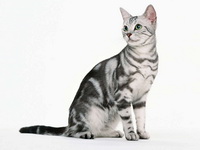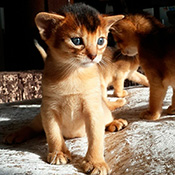About pregnancy cats
 The kitten in your house is an absolutely independent creation, full of confidence in people. His body is weak and defenseless, movements inaccurate and awkward. But time is running, the kitten is growing and acquiring the features of a graceful proud animal. At the same time, he manifests a genetically pledged desire to continue the race, which is signaled by the changing behavior of cats – they start to play around too much and vocalize.
The kitten in your house is an absolutely independent creation, full of confidence in people. His body is weak and defenseless, movements inaccurate and awkward. But time is running, the kitten is growing and acquiring the features of a graceful proud animal. At the same time, he manifests a genetically pledged desire to continue the race, which is signaled by the changing behavior of cats – they start to play around too much and vocalize.
To achieve the physiological maturity of the animal (in cats it is 10-15 months), the owners are faced with the question of castration / sterilization. If your plans do not include breeding cats, then the best option would be to sterilize or castrate the animal. It is best to do this in the period up to six months, not allowing the pet’s body to undergo sexual restructuring, accompanied by sexual behavior. If you want to get offspring from your cat, you must be sure that you can take care of her in this difficult physiological period and, most importantly, provide the kittens with a decent existence.
Already at the stage of mating, the owner must take the breeding seriously. All future vaccinations should be completed for the expectant mother, dehelminthization should be done and all diseases that can harm offspring should be treated. If an animal takes any medications on an ongoing basis, it is necessary to consult with your doctor about their safety during the fruit bearing period. In case of certain genetic pathologies or serious acquired diseases (for example, chronic kidney disease at stages 3-4), it is contraindicated to donate a cat for breeding, therefore, before looking for a partner for your cat, you must be examined and consulted by your veterinarian.
It will also be useful to check all the documents of the future father of the kittens and to request a screening analysis of chronic infections, of which he may be the carrier.
Pregnancy of cats lasts on average 63–65 days. You may notice the first signs of a new pregnancy no earlier than in 3-4 weeks. The cat may begin to round off the tummy, it is more often looking for secluded places, its character is changing for the better – it becomes affectionate and pliable. You can also see the changing color of the nipples from delicate to bright pink. The veterinarian can confirm or deny your guesswork, who from the 21st day of pregnancy will determine the incipient life with the help of an ultrasound machine. He can not only see the embryos in the fetal bladders, but also evaluate their vital activity. It does not interfere with the calculation of future offspring. If the doctor has not determined the pregnancy, do not get upset before the time, just need to repeat the examination a week later.
Pregnant cats are quite independent in caring and childbirth, so the most important thing for owners is to be near and surround your pet with love and care.
The animal should receive daily full feeding, as well as clean water in unlimited quantities. It is necessary to transfer the future mother to a complete feed for pregnant cats and kittens. Such food will cover all energy costs added after pregnancy, as well as supply the body of kittens with essential vitamins, micro- and macronutrients. It is better to make the transition to a new food for 7–10 days, increasing the volume of one feed and reducing the amount of another. However, after the term of feeding, you should not cancel the diet for pregnant cats and kittens. It is important to remember that the cat experiences the greatest need for energy and nutrients not even during pregnancy, but during lactation, especially from the third and up to the 6th-7th week of feeding the offspring. Therefore, it is necessary to transfer the cat back to a regular diet only after full completion of feeding the kittens. An excellent example of food for pregnant cats and kittens is Purina® PRO PLAN® Junior with OPTISTART®. This high-calorie diet with high content of protein, calcium and essential nutrients (fats and amino acids) will fully satisfy all the needs of the future mother.
The diet of the nursing mother should be given to the kittens from 4–5 weeks of age, first using wet canned food, and only then gradually add dry. In order for kittens to better eat dry food, at first it can be soaked with water.
There is no need to strive to limit the mobility of the future mother, as physical activity will even be useful in order to improve blood circulation and nutrition of fetal tissues.
Before birth, it is better to visit a specialist again and analyze the health of the cat and future offspring. Repeat the ultrasound study, check the health of all the kittens, recalculate them again, or perform an additional x-ray examination, which gives a more accurate answer about the number of fruits in the later periods.
Do not worry and too often go and see the doctor for no apparent reason. Cats are very stressful, and pregnancy aggravates this condition.


